Jimmy Powell INTERVIEW
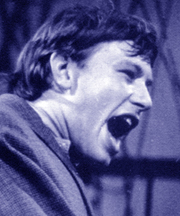
Brum Beat started with a 'big bang' back in 1962 when legendary Birmingham vocalist Jimmy Powell recorded what became the first Brum Beat record release with 'Sugar Babe (parts 1 and 2)'. This ground-breaking single issued on Decca Records, showcased Jimmy's powerful vocal style and launched an incredible career in music that saw him working with many talented and famous names from the British music scene of the 1960s.
After first fronting an early version of Brum's own Rockin' Berries, Jimmy Powell began a solo career before taking the London blues scene by storm with his backing band 'The 5 Dimensions' - a line-up that for a time included a young Rod Stewart.
I was most fortunate to interview Jimmy Powell who graciously agreed to share his recollections of those days. The following is taken from my interview with Jimmy Powell and is exclusive to www.BrumBeat.net
JW: Were you born in Birmingham?
JP: Yes, I was born in Selly Oak.
JW: What school did you go to?
JP: I was in Lozells in Birmingham and then moved to Turves Green School. Nearly all the Rockin' Berries went there. They had just built the place I think. They moved us all over to the green spots. We went to Forrel Grove just off Longbridge Lane down from the Cofton Pub.
JW: What were your main musical influences when you were growing up?
JP: Ella Fitzgerald. I did a lot of scat singing when I first did rock 'n' roll. Ray Charles was also a big influence.
JW: Were you ever into people like Elvis or Buddy Holly?
JP: I liked their music - especially the early Elvis stuff. I didn't like the later 'syrupy' stuff that Elvis did. I was more of a Little Richard fan as my voice is like that.
JW: Your singing voice is very distinctive and powerful.
JP: Somebody said my singing could take the wallpaper off the walls. I've been singing for more than 40 years and a little bit Mutt & Jeff so I'm even more bleeding noisy now!
JW: When was it that you started singing?
JP: I used to have a piece of wood shaped like a guitar with a grill on the front of it and then I would use a penny to to rattle across it like a skiffle board and then sing all the skiffle stuff. The first band I was in was called The Beacon Wheelmen's Skiffle Group' which was a cycling team. My next band was called 'The Jumping Jacks' then it was The Detours and then The Rockin' Berries.
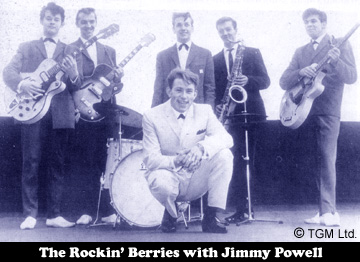
JW: How did you become the lead singer in the Rockin' Berries?
JP: I met the Berries in West Heath. I was the original singer with them. We went to Germany. Jack Good was auditioning for a new television show. We went down to Aston, Birmingham - the old ITV studios. He was more interested in solo artists back then as you know - Billy Fury and people like that. We had also played support for The Beatles in Liverpool where Brian Epstein had an interest in me as a solo artist but I turned him down saying we'll stick together as a band.
JW: Tell me about "Sugar Babe" the first record that you made in 1962.
JP: I recorded my first single in Birmingham - Sugar Babe (part one and two) which was the first rock 'n' roll single to come out of Birmingham.
JW: Was that recorded at Hollick & Taylor?
JP: No, it was down at the old Decca studios with Chris Blackwell producing. Chris then wrote for me 'Strangers On A Train' and did some other recordings with me. I put Chris onto The Spencer Davis Group who were doing very well at the time but were not yet signed to a record label. It was after that that I did 'My Boy Lollipop' with little Millie Small. Chris gave me a Mini Cooper S as a wedding present!
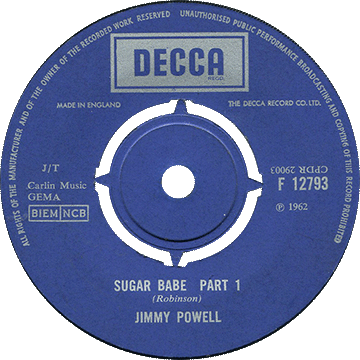
JW: There has been a lot of controversy over who played harmonica on Millie's recording (My Boy Lollipop). Many people believe it was Rod Stewart. Were you actually on that session?
JP: I did the recording. I did the harmonica part. Kenny White was the rhythm guitar player. Rod Stewart has already said he didn't play harmonica on that one. I worked on other stuff for Chris too. I'd just done the harmonica playing on P.J. Proby's 'Hold Me' for Jack Good which was really how I'd actually met up with Chris. Chris Blackwell was trading out of a shop at that time and was looking for people to sign to his new record label - Island Records. That's when I got to do 'My Boy Lollipop' with Millie.
JW: How did your association with the Five Dimensions come about?
JP: I got involved with a London agency 'The Malcolm Nixon Agency'. They had the Carl Denver Trio and were managing Cyril Davis and doing work with his 'All Stars' which included Alexis Korner, Dick Hexall-Smith and people like that. I signed with Malcolm Nixon at the suggestion of Jack Goode. At that time, the blues were getting big in London so I got together a bin-load of blues records and listened to them.
The band who became The Dimensions were just forming at that time. There were only three or four of them - Rod Stewart was not with them then. I can't remember what the band was called. Malcolm Nixon suggested the name The Dimensions. We took this London-based band on and I was with them for about eight months during which we got ourselves established in the London blues scene.
JW: When did Rod Stewart join?
JP: Rod Stewart used to come and see us. He got friendly with a couple of the guys in the band then asked if he could join. He was one of those weird looking guys who the teenagers liked and of course he had a good voice. At the time I said yes as he could warm up the audience and then I would come on. This arrangement lasted about 12 months. What happened was Chuck Berry came over and he wanted us to back him on his first tour over here. I couldn't do it because of other commitments but the band weren't signed to the management so he said he'd take the band which he did. I kept the group's name. Rod left to join Long John Baldry, Brian Auger and The Trinity, and then Jeff Beck.
JW: Rod wasn't one of the original members of The Dimensions then?
JP: No he wasn't. The Dimensions were a local band playing in pubs. We changed the lead guitarist after about two months and I took on a guy from Birmingham called Martin Shaw and also another drummer named Tim Munns from The Rockin' Berries who joined for about six months and we built it up that way.
JW: There were some well known musicians on some of the records you made (Jimmy Page, John Paul Jones, Clem Cattini...)
JP: Some of the backing people I had with me was Big Jim Sullivan and Jimmy Page on guitar.
JW: Who was on the original version of Sugar Babe?
JP: That was Big Jim Sullivan. When we re-cut Sugar Babe it was Jimmy Page. When we were doing the sessions for that one, they asked for some more songs. Jimmy Page said "do us a favor and let's do Sugar Babe" because he liked that record so we did it and on that version Jimmy put in a key change as well so I'm scat singing to a key change which made it quite different.
Bobby Darin wrote 'Sugar Man'. He came over here to record 'If I Was A Carpenter' and I met up with him. He said "I've got a song you should record" so he gave it to Chris Blackwell and said "Get Jimmy to do this" so I wrote and thanked him for it. He died two or three years later. Sugar Man is about drug addiction "Sugar man, sugar man, save some sweets for me..." The kids didn't know that of course.
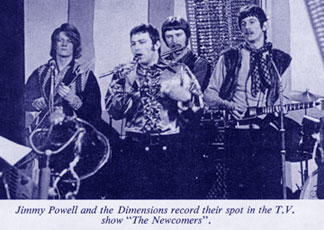
JW: You also did some recording with Micky Dallon.
JP: Yes - he had Don Farndon of 'Indian Reservation' fame. I knew Don and Micky asked me to have a go at some songs he had and we got along very well. We made lots of recordings. The problem was, he was restricted for cash so if you listen to half of Don Farndon's recordings you'll hear the backing tracks from one or two of mine. We'd do a song with a good backing track and then he'd (Micky Dallon) ask Don if he wanted to do it for his next album. We used to do a lot of those. Patti La Belle did work for him as well.
JW: Your popularity as a live performer was not reflected in the record sales.
JP: I just had to work. I couldn't afford not to work when I went down to London. I got married not long after and had three kids. I did lots and lots of dates - was out every day of the week virtually. I was really lucky because I got lots of re-bookings. We had a really good following. I got out of management after a while because of being ripped off so I used to do all my own bookings. I worked together with an agency in Wolverhampton called The Anita Anderson Agency and we had Ambrose Slade then. We sold them to Chas Chandler for a grand!
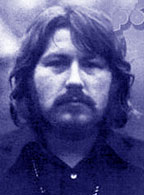
JW: Did you ever live over in Germany?
JP: We did the NAVI tour when you do all the army bases and etc.
JW: What happened to you in the 1970s? You seemed to disappear from the scene.
JP: I just went round doing the circuits really. It was a struggle because the disc jockeys were coming on board and knocking the cobblers out of every live act that was going. I kept going on the night club circuit until a law came out that said you couldn't have live music with gambling. My old road manager offered me a job with a furniture company to work part time so I did that and became successful at it. I got sucked into it and they gave me a position as manager.
I still carried on doing some music as well. I had a band called The Survivors for about five or six years and we used to do pubs which was o.k. About 15 years ago, things got bad for me at home and we decided to call it a day and split. I met a young lady in Leighton Buzzard so I moved there and have been here for more than 10 years now. We got married four years ago.
JW: Are you planning on getting back into music?
JP: I've never really been out of it. People still ask me to do gigs and they always go down very well. Even the people who don't remember me have a good time. I've now got a band and we're thinking of going into the studio to record some music and see how it goes. My two lads also had their own bands. Darren had a group called The Black Cross Band for about ten years and Jamie my youngest son has a band as well and he still does gigs over in Bromsgrove. I started them off in their first bands and they both love music anyway.
JW: Have you written any music recently?
JP: No, I haven't but I do have the urge in me to do it now and come up with something constructive.
JW: I know you've written a lot of stuff in the past.
JP: Yes - boatloads. 'That's Alright', 'Looking For A Woman', 'I've Been Watching You', 'Progressive Talking Blues'. There's more - 'Go Tell That Girl' and 'Aspen Colorado' that got lost years ago and then somebody brought out a bootleg CD in Germany with those on it. I don't know where they got the tapes from. I did manage to get hold of the tapes and we're going to put them out again.
JW: A lot of your records have come out on compilations over the years but I haven't seen anything yet that was officially sanctioned or authorized by you.
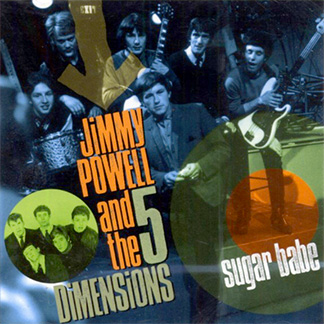
JP: None of it. The CD you have (Jimmy Powell and The 5 Dimensions - Sugar Babe CMRCD 640) has sold quite well I'm told.
JW: Did you associate much with any of the other bands or vocalists in Birmingham during the 1960's?
JP: Yes. Johnny Carroll, Johnny Neal, Denny Laine. When the Moodies first started they came to see me. I lived on a caravan site in Hopwood and was looking for a backing band. Do you remember Mike Caroll? He used to promote a lot of gigs all over Birmingham. He had a band called Sight And Sound. We used to play at The Mackadown Pub that he had where he did his promotions. He went broke eventually and when I worked in transport years later as sales director, I took him on and he worked for me for about 12 years. He died just a couple of years ago.
Jimmy Powell today operates his own successful business with his wife in car park management. I would like to thank Jimmy for his time and allowing me to interview him for this feature exclusive to BrumBeat.net
Copyright © 2008 John R Woodhouse